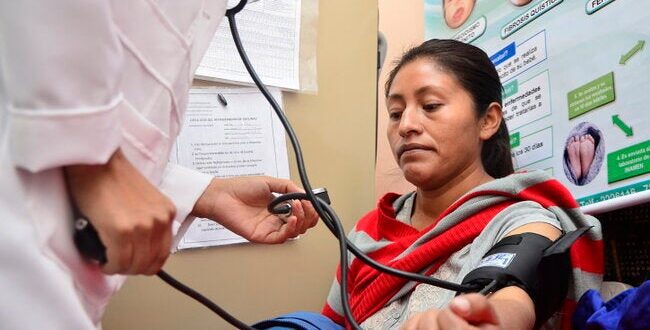Progress Report on the Global Strategy for Women’s Children’s and Adolescent’s Health
Geneva, 25 May 2023 (PAHO/WHO) – Discussions on issues of importance to countries of the Americas continue at the 76th World Health Assembly, taking place this week (21-30 May) in Geneva, Switzerland.
On 24 May, a progress report on the Global Strategy for Women’s Children’s and Adolescent’s Health (2016-2030) was presented, urging countries to step-up investment in family planning interventions and routine postnatal care for women and newborns in a bid to reduce maternal and child mortality.
The report outlined that in most regions of the world – with the exception of Southeast Asia – maternal and child mortality rates have either stagnated or increased. The majority of these deaths are preventable and result from lack of access to sexual and reproductive health services, as well as to prenatal care.
In Latin America and the Caribbean, nearly 8,400 women die each year due to complications related to pregnancy and childbirth, with a disproportionate impact on poor women and those from minority ethnic backgrounds. Approximately 9 out of 10 of these deaths are preventable.
During the discussion, countries of the Americas highlighted the importance of recovering progress towards maternal mortality following the COVID-19 pandemic, with a particular focus on women from vulnerable populations as well as on strengthening mental health initiatives for adolescents.
The WHO’s Global Strategy provides countries with a roadmap to end preventable maternal, newborn and child deaths, including stillbirths, by 2030, as well as to improve their overall health and well-being.
The Intrinsic Link Between Climate Change and Health
During a Strategic Roundtable on the role of the health community in climate action, which also took place on 24 May and included interventions from COP28 CEO Adnan Z. Amin and United States first presidential envoy for climate John Kerry, participants underscored the intrinsic link between climate change and health.
Over the past decades, climate change has led to a rise in extreme weather events, such as hurricanes and floods, as well as an increase in infectious and vector-borne diseases.
This is of particular concern in Small Island Developing States (SIDS) of the Caribbean, which are on the frontlines of climate change impact in the Region yet contribute a comparatively minute percentage to greenhouse gas emissions, a main driver of global warming.
During the roundtable, participants highlighted that health should be a powerful argument to advance the call for action in response to climate change in the run-up to COP28.
 Mind Uncharted Explore. Discover. Learn.
Mind Uncharted Explore. Discover. Learn.




